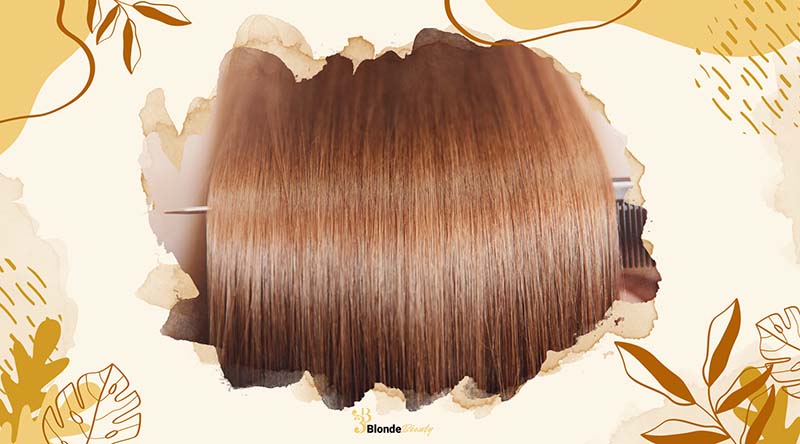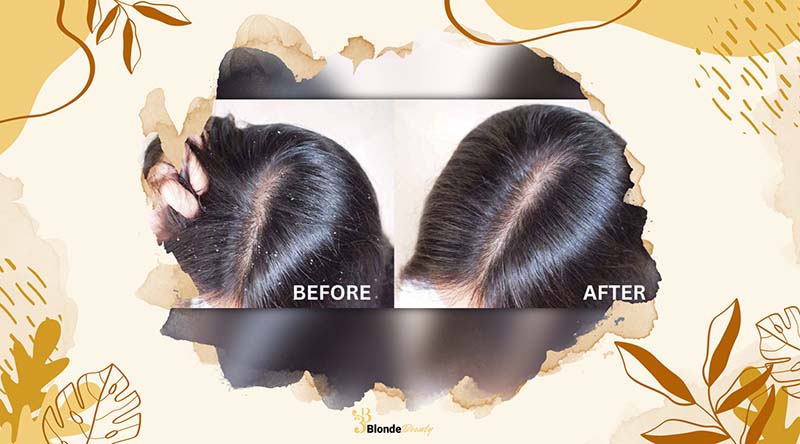Among all citrus fruits, lemons are undoubtedly the most popular. They not only add a tangy flavor to dishes like lemon tarts but are also widely used in beauty treatments.
While the advantages of lemon juice are well-known in skincare, it also offers significant benefits for hair care. So, is lemon good for hair? Let’s explore.
Is Lemon Good for Hair?
Lemon juice is often overlooked as a natural hair treatment, yet it’s packed with an array of beneficial nutrients and antioxidants such as citric acid, ascorbic acid (vitamin C), iron, potassium, calcium, phosphorus, and essential oils like limonene and linalool, along with various flavonoids.
These components are crucial for promoting hair growth and combating common hair issues like dandruff, hair loss, excessive oiliness, split ends, and scalp inflammation.
Incorporating lemon juice into your hair care routine can significantly enhance the health and shine of your hair. The active compounds in lemon juice target the hair follicles and the scalp, nourishing and strengthening the hair strands from root to tip.

Benefits of Using Lemon On Hair
Lemon offers a plethora of benefits for hair care, making it a superb addition to your routine. Here are some reasons why:
Enhances Natural Shine
Lemon is a boon for those with rough or curly hair. It contains limonene, which helps rejuvenate dry, frizzy, and coarse strands, giving them a healthier, more vibrant look. Lemon juice is packed with antioxidants and essential nutrients that promote smoothness and hair health.
The high levels of folic acid and vitamin C in lemons enhance its effectiveness in boosting hair vitality. It also tackles excess oiliness, leaving your hair with a silky, lustrous finish and improved manageability.

Fights Dandruff
Dandruff is a common yet troublesome issue, and lemon juice is an effective natural remedy. Thanks to its antifungal and cleansing properties, lemon juice tackles the root causes of dandruff, such as fungal growth and excess oil.
Mixing lemon juice with olive oil to create a scalp scrub can exfoliate dead skin cells and clear product buildup, reducing flakiness. The citric acid in lemons helps manage oil production, making it especially useful for those with seborrheic dermatitis.

Boosts Scalp Health
A healthy scalp is essential for healthy hair. Lemon juice excels in regulating oil production and maintaining a balanced scalp environment, which inhibits dandruff-causing fungi.
It provides hydration for dry scalps, alleviating itchiness and flaking, and its antifungal qualities help prevent scalp acne, ensuring your scalp stays healthy and clear.
Acts As a Natural Hair Cleanser
Lemon juice serves as a gentle natural cleanser, effectively removing dirt, oil, and buildup without stripping the hair’s natural oils.
Its acidic nature clarifies the scalp and hair follicles, refreshing and revitalizing your hair. This makes it a kind and effective option for all hair types.
Strengthens Hair
Lemon juice is rich in vitamin C, which stimulates collagen production essential for hair growth and strength.
It also boasts antioxidants and nutrients like folic acid, which nourish and protect the hair follicles from damage. Regular use of lemon juice can fortify your hair from the roots, reducing breakage and enhancing overall hair health.

Provides a Natural Hair Fragrance
Beyond its cleansing and nourishing benefits, lemon juice leaves a delightful citrusy scent in your hair.
This natural fragrance is refreshing and uplifting, enhancing your hair care experience with a subtle and pleasant aroma, unlike overpowering synthetic fragrances.
Addresses Oily Hair
For those battling oily hair, lemon juice is a game-changer. Its astringent properties help control oil production, making your hair look less greasy and more voluminous.
By balancing scalp oil levels, lemon juice also reduces the need for frequent washing, which can otherwise exacerbate oiliness.
Lemon Juice Hair Treatments
Lemon juice offers versatile and effective methods for enhancing hair health and growth. It can be used in various forms, such as a rinse, hair mask, scalp cream, or combined with natural substances like castor oil, olive oil, coconut water, aloe vera, honey, and yogurt.
Hair Rinse
Creating a hair rinse with lemon juice is a simple way to rejuvenate your hair. Mix 1/4 cup of lemon juice with warm water. After shampooing, pour this mixture over your hair and massage it through your strands. Rinse it out thoroughly at the end of your shower for a refreshing cleanse.
Hair Mask
For a nourishing hair mask, combine 1 egg, the juice from half a lemon, and 1 teaspoon of olive oil. Mix these ingredients well and apply the mixture to wet hair. Ensure it’s well-distributed through your hair strands. Let it sit for 20-30 minutes, then rinse with warm water and gently pat dry.
Scalp Cream
Prepare a soothing scalp cream by mixing 1 tablespoon of olive oil with either 5 drops of lemon essential oil or 1/4 cup of lemon juice. Massage this blend into your scalp thoroughly. Leave it on for 1-2 hours, or overnight for deep conditioning. Rinse off in the morning to reduce scalp inflammation and enhance hair health.
Castor Oil
Combining castor oil with lemon juice creates a potent treatment for dandruff and other scalp inflammations, helping to soothe irritation and promote a healthy scalp environment.
Olive Oil
Olive oil works well as a carrier for lemon juice, softening its acidity to prevent potential irritation. This mixture is excellent for conditioning and improving the overall health of your hair.
Aloe Vera
A mix of lemon juice and aloe vera gel forms an antioxidant-rich blend that protects hair from breakage and reduces the appearance of split ends, enhancing the hair’s overall strength and vitality.
Honey
Honey paired with lemon juice makes for an effective hair mask. This combination strengthens the hair, diminishes oiliness, and enhances shine, leaving your hair looking healthier and more lustrous.
Note: While lemon juice is beneficial for hair care, its acidic nature can lighten hair when exposed to sunlight. Always use diluted lemon juice for treatments and avoid sun exposure right after application to maintain your hair color and integrity.
Does Consuming Lemon Juice Benefit Hair Health?
Lemons are packed with health-promoting properties, including high levels of vitamin C, soluble fiber, and beneficial plant compounds. While there is no concrete scientific evidence directly linking the consumption of lemon juice to improved hair health, the overall nutritional benefits of lemons are well-documented.
Research has shown that lemons can aid in weight loss, reduce the risk of heart disease, help prevent anemia and kidney stones, and improve digestive health. There is also anecdotal evidence suggesting a potential role in cancer prevention.
Although no specific studies have conclusively proven that consuming lemon juice directly enhances hair health, adding lemons to your diet can contribute to your overall wellness.
The general health benefits of lemons may indirectly influence hair health by improving your nutritional status, although further research is needed to explicitly confirm this potential benefit. Incorporating fresh lemon juice into your daily routine is a healthful practice that could have positive, albeit indirect, effects on your hair.
Disadvantages of Lemon Juice On Hair
While lemon juice is often touted for its potential benefits for hair health, it’s important to be aware of the potential drawbacks associated with its use.
- May Cause Skin Irritation Although anecdotal evidence supports the use of lemons for treating dry skin and dandruff, caution is advised, particularly for individuals with sensitive skin conditions like eczema or psoriasis. The citric acid in lemon juice is potent and can lead to skin irritation. If you experience redness, increased irritation, or itchiness after applying lemon juice, it’s advisable to discontinue its use.
- May Cause Contact Reaction Another concern is phytophotodermatitis, a contact reaction that can occur with certain plants, including lemons. This condition is characterized by inflammation and blisters, which may be followed by dark pigmentation spots on the skin that can persist for several weeks. Although this reaction primarily affects the skin and not the hair, it can impact the scalp, especially when exposed to sunlight after applying lemon juice.
Note: When using lemon juice on your hair or scalp, always perform a patch test first to ensure there is no adverse reaction. It’s also crucial to dilute lemon juice with water or a carrier oil to mitigate potential irritation. Avoid sun exposure immediately after applying lemon juice to prevent any reactions that could be exacerbated by UV rays.
Conclusion
Is Lemon Good for Hair? While lemons contain citric acid that can naturally lighten hair, especially lighter tones, based on anecdotal evidence, there are risks involved. Lemon juice can cause skin irritation or reactions, so it’s advisable to conduct a patch test before applying it to your hair and scalp. For achieving specific highlights or if adverse effects occur, consult a hairstylist or dermatologist respectively.
Don’t forget to check out more blogs from Blonde Beauty for additional tips and insights on achieving your best hair ever.

Laureate Professor Clare Collins
Professor Clare Collins is a leading expert in nutrition and dietetics at the School of Health Sciences, part of the College of Health, Medicine and Wellbeing. Her work is changing the way we think about food and health. She grew up as one of nine children and was the first in her family to finish high school and go to college. This background gave her a strong work ethic and a deep appreciation for seizing opportunities.
As the Director of the Hunter Medical Research Institute’s Food and Nutrition Program and a recipient of three NHMRC Research Fellowships, Professor Collins is making a big difference in public health. She focuses on helping people who are often overlooked, using new technologies like apps and online programs to improve their nutrition and reduce the risk of chronic diseases.
Professor Collins is well-respected and has been recognized as a Fellow in four major health and science organizations. She leads a diverse team of experts, including dietitians, computer scientists, and engineers, working together on global health projects.
Her achievements are impressive. She has received over $29 million in research funding, published more than 450 papers, and helped 35 PhD and Master’s students complete their degrees. She’s also active in sharing her knowledge with the public. She has developed tools like the Australian Eating Survey and the Healthy Eating Quiz, and she often appears in the media to talk about nutrition.
PUBLISHED ARTICLES
- Collins, C. (2019). “The Effect of a Pilot Dietary Intervention on Pain Outcomes in Patients Attending a Tertiary Pain Service.”
- Collins, C. (2022). “Variation in cardiovascular disease risk factors among older adults.”
- Collins, C. (2022). “Evaluation of an online intervention for improving stroke survivors’ health-related quality of life: A randomised controlled trial.”
These articles show Professor Collins’s commitment to understanding how better nutrition can improve health. Her work is important for researchers, doctors, and anyone interested in healthy living.
